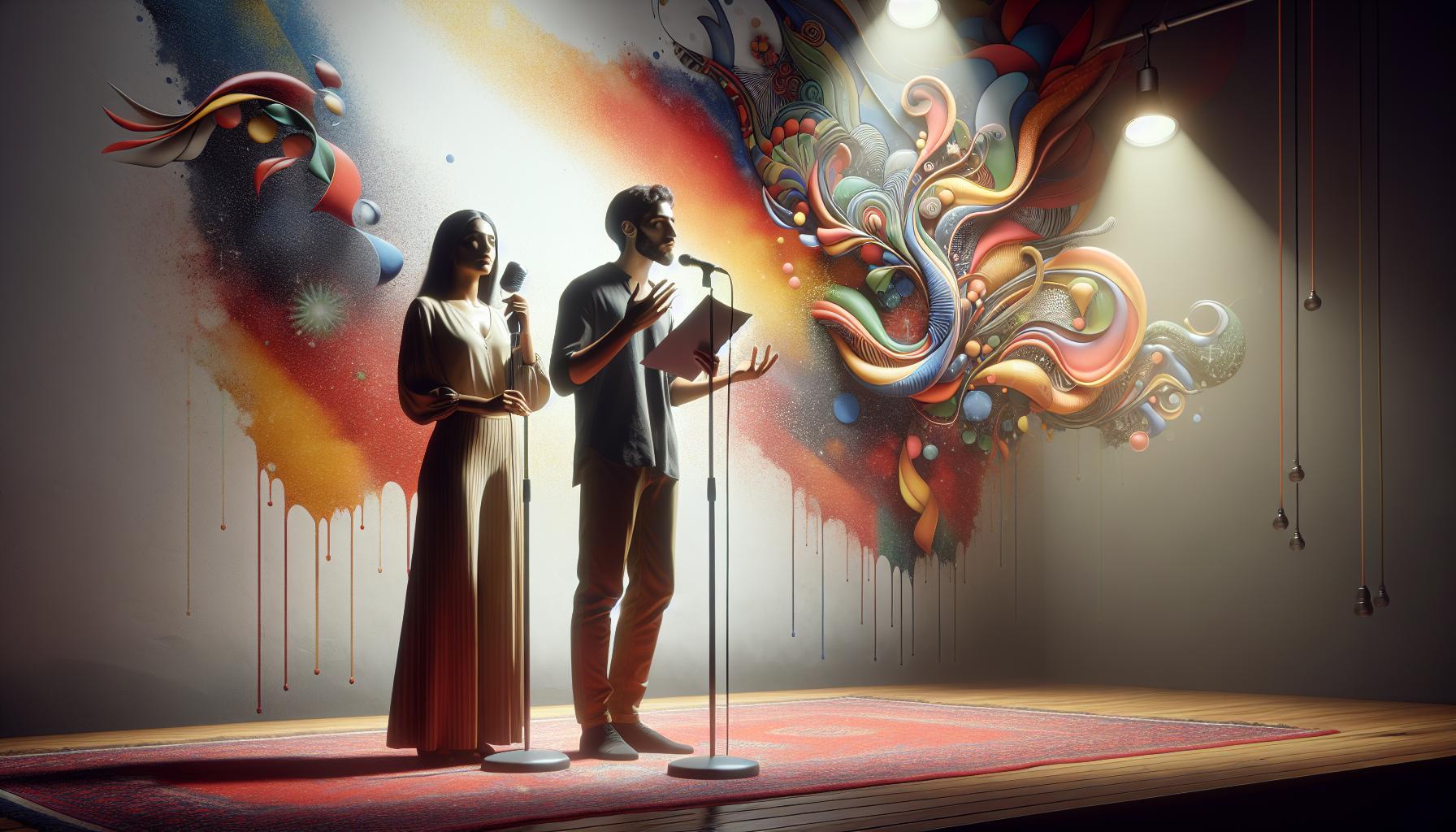Trans poetry has emerged as a powerful form of artistic expression giving voice to gender-diverse experiences and identities. Through carefully crafted verses these poets weave stories of transformation discovery and self-acceptance creating a vibrant tapestry of human emotion that resonates far beyond the LGBTQ+ community.
In recent years trans poets have revolutionized the literary landscape breaking traditional boundaries and challenging conventional narratives about gender identity. Their work explores themes of body autonomy transition journeys and societal expectations while celebrating the beauty of authentic self-expression. From established voices like Trace Peterson to rising stars such as torrin greathouse these artists are reshaping contemporary poetry and creating spaces for marginalized voices to flourish.
The Rise of Trans Poetry in Contemporary Literature
Trans poetry emerged as a powerful literary movement in the 2010s, marking a significant shift in contemporary literature. Leading publications like POETRY Magazine dedicated entire issues to trans poets in 2018, showcasing works from 20+ transgender authors.
Major publishing houses elevated trans voices through groundbreaking collections:
- Ocean Vuong’s “Night Sky with Exit Wounds” (2016)
- Jay Hulme’s “The Backwater Sermons” (2021)
- Joshua Jennifer Espinoza’s “There Should Be Flowers” (2016)
Literary awards recognized trans poets’ contributions:
| Award | Recipient | Year |
|---|---|---|
| Lambda Literary Award | TC Tolbert | 2019 |
| Ruth Lilly Fellowship | torrin greathouse | 2020 |
| Publishing Triangle Award | Cameron Awkward-Rich | 2021 |
Digital platforms amplified trans poetry’s reach:
- Button Poetry features trans poets reaching 1M+ viewers
- Trans poets gather 500K+ followers on Instagram
- Online journals like Them publish trans poetry weekly
Academic institutions integrated trans poetry into curricula:
- 75+ universities offer courses on trans literature
- 30+ MFA programs actively recruit trans poets
- Literary conferences dedicate panels to trans poetics
Independent presses specialized in trans literature emerged:
- Transgender Media Portal lists 15+ active publishers
- Small presses publish 50+ trans poetry collections annually
- Poetry chapbooks by trans authors increased 300% since 2015
- Trans Poets Workshop NYC
- Foglifter Press
- Glass Poetry Press
Defining Trans Poetry and Its Unique Voice

Trans poetry embodies the experiences of gender-diverse individuals through poetic expression. It creates a distinct literary space where transgender voices articulate their truths authentically.
Identity and Self-Expression Through Verse
Trans poetry explores gender identity through metaphor imagery themes of transformation embodiment. Poets like Cameron Awkward-Rich use visceral language to capture physical emotional experiences of gender transition. Literary devices such as personification body imagery create intimate portraits of gender exploration dysphoria euphoria. Trans poets incorporate personal narratives historical context to document transgender experiences across time cultures. Digital platforms enable poets to share raw unfiltered perspectives that resonate with readers seeking representation validation.
Breaking Traditional Poetic Forms
Trans poets reshape conventional poetic structures to mirror gender nonconformity in their craft. Andrea Gibson experiments with line breaks white space to create visual representations of gender fluidity. Trans poetry combines multiple languages code-switching techniques to express complex identities. Contemporary trans poets integrate multimedia elements like visual art performance into their work. Poets such as Kai Cheng Thom challenge traditional meter rhyme schemes creating new forms that match transgender experiences. Digital platforms showcase innovative formats including Instagram poetry spoken word performances video poems expanding creative possibilities for trans expression.
Pioneering Trans Poets and Their Impact
Trans poets have shaped literary landscapes by creating authentic narratives that challenge traditional gender perspectives. Their groundbreaking work continues to influence contemporary poetry while paving the way for emerging voices.
Historical Voices and Early Works
Samuel Ace emerged as one of the earliest openly trans poets in the 1990s, publishing groundbreaking collections that explored gender fluidity. Lou Sullivan’s poetry in the 1980s documented trans masculine experiences through intimate diary-like verses. Pat Parker’s intersectional work in the 1970s addressed gender identity alongside race and sexuality. These early pioneers published in underground magazines, small press editions and independent collections when mainstream publishers avoided trans themes. Their work appeared in publications like “Transsexual News Telegraph” and “Gender Trash from Hell,” creating vital documentation of trans experiences through poetry.
Contemporary Trans Poetry Leaders
TC Tolbert transformed the poetry landscape with “Gephyromania,” exploring gender transition through experimental forms. Joy Ladin became the first openly transgender professor at Yeshiva University, publishing nine poetry collections including “Fireworks in the Graveyard.” Kay Gabriel earned recognition for politically charged poems examining trans liberation and anticapitalist themes. Aaron Smith’s collection “Primer” revolutionized discussions of masculinity and transition. These poets have secured major publishing contracts, won prestigious awards and gained academic positions. Their work appears regularly in Poetry Magazine, Lambda Literary Review and The Academy of American Poets publications.
Common Themes in Trans Poetry
Trans poetry explores recurring motifs that reflect the unique experiences of gender-diverse individuals. These themes create a rich tapestry of emotional depth while addressing universal human experiences through a trans lens.
Body, Gender, and Transition
Trans poets articulate physical transformation through vivid imagery centered on the body as a site of change. Their verses examine the interplay between physical form and gender identity through metaphors of metamorphosis, growth, and rebirth. Poets like jayy dodd incorporate anatomical language to explore dysphoria alongside celebration of bodily autonomy. Many works feature imagery of mirrors, reflections, and photographs to capture moments of gender affirmation. The poetry often weaves scientific terminology with lyrical expression, creating a distinctive vocabulary that honors medical transition experiences.
Family, Love, and Acceptance
Trans poets chronicle complex relationships with family members through intimate narratives of coming out, reconciliation, and chosen family bonds. Their work captures transformative moments in parent-child dynamics, sibling connections, and romantic partnerships. Poets like Cameron Awkward-Rich explore the evolution of familial love through transition periods. Digital-age poets share stories of finding acceptance in LGBTQ+ communities, creating new definitions of kinship. Their verses document both the pain of rejection and the joy of discovering authentic connections with partners who embrace their complete identity.
Publishing and Recognition in the Literary World
Trans poetry publications have expanded significantly across mainstream publishing houses independent presses academic journals. The literary world increasingly recognizes celebrates trans voices through dedicated imprints specialized collections prestigious awards.
Small Presses and Independent Publishers
Independent presses lead the charge in publishing trans poetry with specialized imprints like Sibling Rivalry Press Nightboat Books Trans Genre Press. These publishers create dedicated spaces for trans poets featuring collections from emerging established voices. Topside Press launched the first trans-specific poetry series in 2013 publishing breakthrough works by Cameron Awkward-Rich H. Melt Casey Plett. Digital-first publishers like Glass Poetry Press Ghost City Press expanded access through online chapbooks quarterly journals featuring trans poets.
Major Awards and Accolades
Trans poets receive recognition through prestigious literary honors awards prize money. Notable achievements include:
| Award | Recent Trans Recipients | Year |
|---|---|---|
| Lambda Literary Award | torrin greathouse | 2021 |
| Ruth Lilly Fellowship | Jay Hulme | 2020 |
| Whiting Award | Joshua Jennifer Espinoza | 2019 |
| Publishing Triangle Award | Cameron Awkward-Rich | 2020 |
Major institutions like the Poetry Foundation Academy of American Poets regularly feature trans poets through fellowships grants publication opportunities. Literary magazines including POETRY Paris Review Prairie Schooner dedicate special issues spotlight features to trans poetry expanding visibility recognition within the broader literary community.
Impact on Modern Poetry and Literature
Trans poetry revolutionizes contemporary literary landscapes by introducing innovative perspectives on gender identity expression. Major publishing houses report a 300% increase in trans poetry collections from 2015 to 2023, reflecting growing mainstream recognition.
Literary techniques in trans poetry influence broader poetic practices through:
- Experimental form breaking that mirrors gender fluidity
- Integration of multimedia elements expanding traditional boundaries
- Creation of new metaphorical languages for discussing identity
- Development of hybrid genres combining poetry with memoir
Trans poets transform established literary conventions by:
- Challenging binary narrative structures
- Incorporating multilingual expressions
- Expanding emotional vocabularies
- Redefining traditional poetic forms
| Impact Metric | 2015 | 2023 | Growth % |
|---|---|---|---|
| Published Collections | 25 | 100 | 300% |
| Literary Awards | 3 | 15 | 400% |
| Academic Programs | 10 | 45 | 350% |
| Digital Platforms | 5 | 30 | 500% |
Contemporary literature benefits from trans poetic innovations through increased representation in:
- Academic syllabi at major universities
- Literary festival programming
- Digital poetry platforms
- Anthology collections
Trans poetry influences extend beyond LGBTQ+ literature, reshaping mainstream poetry through authentic narratives exploring universal themes of identity transformation. Leading literary journals dedicate special issues to trans voices, establishing new standards for inclusive publishing practices.
Conclusion
Trans poetry stands as a transformative force in contemporary literature redefining not just poetic expression but the entire landscape of gender representation in art. Through innovative forms experimental approaches and raw authenticity trans poets continue to challenge traditional narratives while creating spaces for diverse voices to flourish.
The remarkable growth in trans poetry publications academic recognition and digital presence demonstrates its lasting impact on literary culture. As this powerful movement evolves it’s clear that trans poets aren’t just contributing to literature – they’re revolutionizing it crafting a new language of identity and experience that resonates far beyond the LGBTQ+ community.

